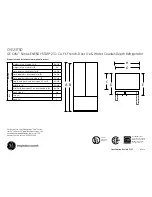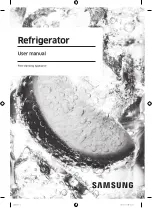
7
-
Cover foods and wipe containers dry before placing them in the refrigerator. This cuts down on moisture build-up inside
the unit.
-
Do not overcrowd the refrigerator or block cold airvents. Doing so causes the refrigerator to run longer and use more
energy. Shelves should not be lined with aluminum foil, wax paper or paper toweling. Liners interfere with cold air
circulation, making the refrigerator less efficient, which could cause food spoilage.
-
The arrangement of food for storage and for freezing, where applicable, particularly including advice that food to be frozen
is not to be placed in direct contact with food in storage and, if appropriate, that it could be necessary to reduce the
quantity to be frozen if freezing every day is anticipated.
-
During prolonged absences (example: vacations), it is advisable to disconnect the refrigerator, remove all the food, and
clean it . The door should be left slightly open to avoid mold and unpleasant odors. This will not affect the refrigerator when
it is reconnected.
-
During short absences (example: holidays), the refrigerator can remain on. However, remember that prolonged power
outages may occur while you are gone.
-
The door to the evaporator clearance can be used to store food.
-
The storage time(s) recommended by the food manufacturers for any kind of food and particularly for commercially quick-
frozen food in food-freezer and frozen-food storage compartments or cabinets.
-
The precautions necessary to prevent an undue rise in the temperature of the frozen food while defrosting the refrigerating
appliance, such as wrapping the frozen food in several layers of newspaper.
-
The fact that a rise in temperature of the frozen food during manual defrosting, maintenance or cleaning could shorten the
storage life.
-
The care required with regard to frozen food in storage in the event of an extended non-running of the refrigerating
appliance (interruption of power supply or failure of the refrigerating system).
-
It is better wrapping the frozen food in several layers of the glass shelves.
-
The care required with regard to frozen food in stora.
TROUBLESHOOTING GUIDE
Many common refrigerator problems can be easily, saving you the cost of a possible service call.
Try the suggestions below to see if you can solve the problem before calling for service.
PROBLEM
POSSIBLE CAUSES
Refrigerator does not operate.
Power cord isn’t plugged in properly.
The circuit breaker tripped or a blown fuse.
The light is not working.
The light bulb may be damaged. Refer to page 5 on how to change the
globe.
Compressor runs all the time
The room temperature is hotter than normal.
A large amount of food has been added to the refrigerator.
The door is opened too often.
The door is not closed completely.
The temperature control is not set correctly.
The door gasket does not seal properly.
The refrigerator does not have the correct clearances.
The refrigerator has recently been disconnected for a period of time. 4+
hours are required for the refrigerator to cool down completely pending on
operating conditions.



























